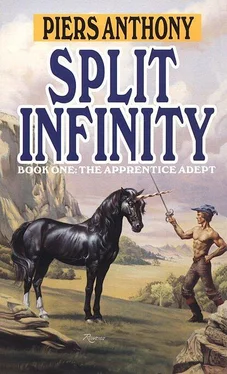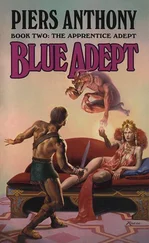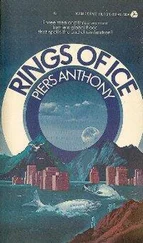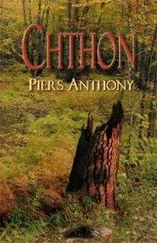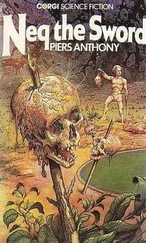Piers Anthony - Split Infinity
Здесь есть возможность читать онлайн «Piers Anthony - Split Infinity» весь текст электронной книги совершенно бесплатно (целиком полную версию без сокращений). В некоторых случаях можно слушать аудио, скачать через торрент в формате fb2 и присутствует краткое содержание. Год выпуска: 2011, Жанр: Фэнтези, на английском языке. Описание произведения, (предисловие) а так же отзывы посетителей доступны на портале библиотеки ЛибКат.
- Название:Split Infinity
- Автор:
- Жанр:
- Год:2011
- ISBN:нет данных
- Рейтинг книги:5 / 5. Голосов: 1
-
Избранное:Добавить в избранное
- Отзывы:
-
Ваша оценка:
- 100
- 1
- 2
- 3
- 4
- 5
Split Infinity: краткое содержание, описание и аннотация
Предлагаем к чтению аннотацию, описание, краткое содержание или предисловие (зависит от того, что написал сам автор книги «Split Infinity»). Если вы не нашли необходимую информацию о книге — напишите в комментариях, мы постараемся отыскать её.
Split Infinity — читать онлайн бесплатно полную книгу (весь текст) целиком
Ниже представлен текст книги, разбитый по страницам. Система сохранения места последней прочитанной страницы, позволяет с удобством читать онлайн бесплатно книгу «Split Infinity», без необходимости каждый раз заново искать на чём Вы остановились. Поставьте закладку, и сможете в любой момент перейти на страницу, на которой закончили чтение.
Интервал:
Закладка:
These constituted Stile’s world, during much of his working time. He came to know them all, from a moderate distance, from Shetland pony to massive draft horse. He longed to associate more closely with them, to pat them, brush them, walk them—but that was the prerogative of the stable hands, fiercely guarded. Stile was only a pasture hand, never allowed to get overly familiar with the stock. On many days his closest approach to a living horse was its manure.
Yet from that necessary distance, what beauty! There was a peculiar grace to a horse, any horse. The power of the muscles, the spring of the ankles, the alertness of the ears, the constant swishing of the tail.
There were no natural flies here, so android flies were provided, that made loud buzzing sounds and swooped around the horses, just to provide exercise for those tails. Stile loved to watch the tails, perhaps the prettiest thing about any horse except for the manes. On occasion he saw a visiting horse with a red ribbon tied in the tail: the signal of an animal that kicked. If a pasture or stable hand got kicked, he was punished, not the valuable horse. Serfs were expected to be careful, not risking the horses’ precious feet by contact with the serfs drab flesh.
Stile made the best of it. He was hardly conscious of this at the time, but the extreme value placed on horses here was to make a profound impression on his attitude in life. These were not the racing animals; these were the retirees, the injured, the secondary steeds—yet they were worth more than the lives of any of the serfs. Some serfs rebelled, secretly hating the animals they tended, but Stile absorbed the propaganda completely in this respect. The horse became his ideal. The horse, though confined to its pasture, had perfect freedom, for the pasture was equine heaven. If Stile had been a horse, he would have been in heaven too. Horses be-came prettier than people in his eyes, and though intellectually he denied this, emotionally he accepted it. Stile was in love with horses.
Thus he became an avid student of the species. Not only did he study the nuances of the mannerisms of the particular animals in his pastures, noting that each horse had a personality fully as distinct as that of any serf; during his free time he studied texts on horse manure. He learned of the intestinal parasites that might be found in it, the worms and the maggots and microscopic vermin. Of course there were no such parasites here, but he pretended there might be, and looked assiduously for the signs. He learned to judge the general health of a horse by its manure; whether it was being worked hard or was idle; what its diet was and in what proportions. Some horses had hard clods, some loose; Stile could tell which horse had produced any given pile, and thus was aware of the past day’s location of each horse without ever seeing the animals directly.
Time passed. One day, two years into his tenure, Stile actually spied a worm in manure. He reported this immediately to the foreman. “A worm in our manure?” the man demanded incredulously. “You’ve got delusions of grandeur!”
But they tested the horse, for the foreman let nothing pass unverified, and Stile was correct. A slow-hatching variety of parasite had slipped through the quarantine and infected the animal. It was not a serious bug, and would not really have hurt the horse, but it was genuine. The larvae had manifested in the manure only on the day Stile noted them; he had caught the nuisance before it could spread to other animals.
The foreman took Stile to the shower, washed him personally as if he were a child, and combed his hair with an available currycomb. Stile submitted, amazed at this attention. Then the foreman brought him, shining clean, to a small door in the wall of the stable. “Always say ‘sir’ to him,” the foreman said warningly.
“Never turn your back until he has dismissed you.”
Then he guided Stile firmly through the door.
Stile found himself, for the first time, in the presence of his employer. The other side of the bam was a palatial apartment, with videoscreens on three walls. On each screen was a portion of a composite picture: the surface of a mountainous land as seen from the air. The image shifted in three-dimensional cohesion, making the illusion most effective. The floor was almost trans-parent quartz, surely imported from a quarry on Earth, thus more valuable weight for weight than local gold. What affluence!
The Citizen sat in a plush swivel chair upholstered in purple silk, on whose armrests a number of control buttons showed. He was garbed in an ornate robe that seemed to be spun from thread made of platinum, and wore fine suede slippers. He was not an old man, and not young; rejuvenation treatments made his body handsome and his age indeterminate; though behind that facade of health, nature surely kept accurate score.
Few Citizens lived much over a century despite the best medicine could do. He possessed no overpowering atmosphere of command. Had Stile encountered him on the streets, serf-naked, he would never have recognized him as a Citizen. The man was completely human. It was the clothing that made the difference. But what a difference it made!
The Citizen was facing to the side, his eyes on a passing cloud. He seemed unaware of Stile’s intrusion. The foreman jogged Stile’s elbow. Stile tried several times, and finally choked out his announcement of arrival: “S-sir.”
The Citizen’s eyes flicked to cover him. “You are the lad who spotted the worm?” The voice was ordinary too, amazingly.
“Yes, sir.”
“You are promoted to stableboy.” And the Citizen rotated in his swivel chair, turning his glossy back, dismissing Stile.
Stile found himself back in the bam. He must have walked there, guided by the foreman. Now the man led him by the hand to a cabin at the edge of the pasture. Three stable hands stood beside it, at attention.
“Stile is joining you,” the foreman said. “Fetch his gear.”
With alacrity they took off. In moments Stile’s bed-ding, body brush and towel were neatly set up by the fourth bunk in the cabin. The stable hands were congratulating him. He was, of course, low man of the house—the “boy”—but it was like a fraternity, a giant improvement from the barracks. Only four to share the shower, curfew an hour later, and a cabin vidscreen!
Stile’s days of spading and hauling manure were over. A new serf took his place in the pastures. Stile was now of a higher echelon. He was working directly with the horses. Reward had been as swift and decisive as punishment for infractions; at one stroke the Citizen had made two years of dung worthwhile.
Stile lifted his eyes from the manure of this wilder-ness realm. Oh, yes, he knew about manure! He had never forgotten what dung had done for him. He considered it not with distaste or horror, but almost with affection.
He walked on down the river, inspecting hoofprints and manure. Some of these horses were large, some medium, some healthy, some less so. Some did have worms in their droppings, and these gave Stile a perversely good feeling. A worm had promoted him!
This region, then, was not sterile; it was natural. Flies hovered about the freshest piles: genuine flies, he was sure, species he knew only from books and museum specimens. No one policed this region; the old piles lay undisturbed, sprouting toadstools, gradually settling, dissolving in rainfall, bright green grass growing up through them. No self-respecting horse would eat at a dung-site, so such blades remained undipped. Nature’s way of preventing overgrazing, perhaps—but Stile was appalled to see such an excellent pasture in such disrepair. Did no one care about these horses?
They must be wild, uncared for. Which meant that he would be free to take whichever one he chose. He might have to break it for riding—but he knew how to do that. Even with his injured knees he could ride any horse. Only specialized racing required extreme flexure of the knees; for other riding the legs were used for balance, for purchase, and guidance of the steed.
Читать дальшеИнтервал:
Закладка:
Похожие книги на «Split Infinity»
Представляем Вашему вниманию похожие книги на «Split Infinity» списком для выбора. Мы отобрали схожую по названию и смыслу литературу в надежде предоставить читателям больше вариантов отыскать новые, интересные, ещё непрочитанные произведения.
Обсуждение, отзывы о книге «Split Infinity» и просто собственные мнения читателей. Оставьте ваши комментарии, напишите, что Вы думаете о произведении, его смысле или главных героях. Укажите что конкретно понравилось, а что нет, и почему Вы так считаете.
